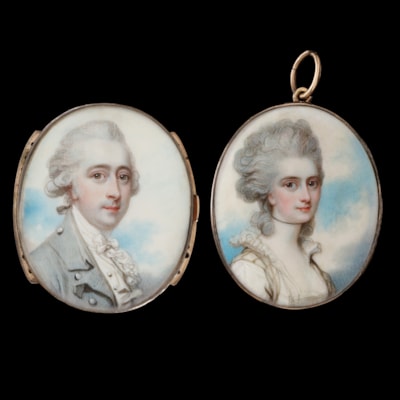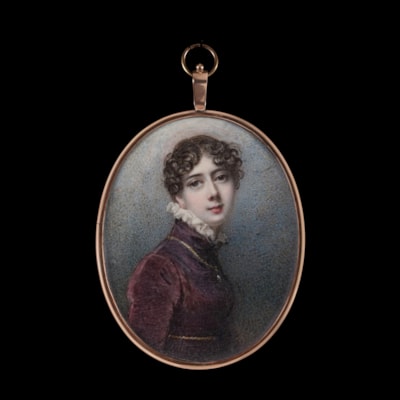RICHARD COSWAY
(1742-1821)Portrait of William Joseph Denison (1770-1849), facing right, in a blue coat, with a white waistcoat and cravat
c.1785-1795
Watercolour on ivory (licence 1CBLK4D2)
Oval, 8 cm (3 ⅛ in) high
Gilt-metal frame
£6,000
The style and handling of this portrait suggest that it was painted in the late 1780s or early 1790s, when William was working for his father’s firm, Denison, Hayward, and Kennard of Lombard Street. Only a few years later, he would begin his political career and was elected as MP of Camelford in 1796. He remained an MP throughout his life, with his final seat being Surrey, from 1818 until his death.
Denison must have been too focused on building a successful career to have burdened himself with thoughts of matrimony, and he died unwed in 1849. His wealth at this time was estimated to be £2.3 million, making him one of the wealthiest men in Britain. The entirety of his fortune, including the present work, was left to his nephew, Lord Albert Denison, first Baron Londesborough, his sole heir.
For Richard Cosway, important patrons such as Denison played a key role in building a reputation for his miniatures. Cosway had trained at William Shipley’s Drawing School and had been sent to London before he was twelve to undertake this study. As a successful artist, he became the miniature painter to the Prince of Wales. His portraits often depict important figures from British society, and have distinct styles according to different points in his life. As has already been mentioned, the style of the present work allows it to be dated to the 1780s/90s, and this suggestion comes from the lightness of the colours and sky background of the portrait. Furthermore, many of his male subjects from this period are depicted with a similar outfit to William’s here.
[1] A Mezzotint after this portrait by William Giller can be found in the National Portrait Gallery’s collection, NPGD35019.
Sold Galerie Fischer, Lucerne, 16-22 June 1959, lot 668;
Schidlof Galleries, London, 1961;
Sotheby’s, London, 14 December 1981, lot 113;
Christie’s, London, 22 March 1988, lot 320 (withdrawn);
Christie’s, London, 15 October 1996, lot 50;
Private collection since 2017.

shipping notice
Worldwide shipping is included in all prices.
The Limner Company does not accept any responsibility for import duty, this is to be paid by the buyer.
Some stock items contain materials from endangered species which are governed by CITES regulations and will require a permit to export outside of Great Britain. If a certificate of export is required then this will be the responsibility of and paid for by the buyer .
you may also like



 +44(0)7983510056
+44(0)7983510056











